Rep Mo Brooks calls Nancy Pelosi State of the Union cancellation unprecedented and radical
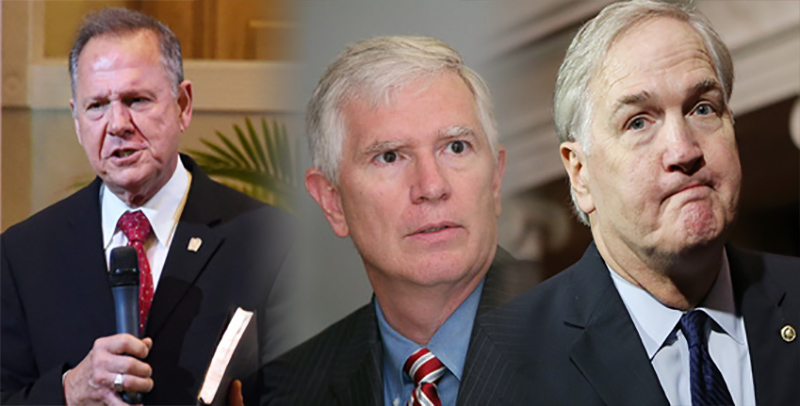
Republican Congressman Mo Brooks released a statement Wednesday in the wake of Speaker Nancy Pelosi telling President Donald Trump that the House would not authorize a State of the Union speech while the government was shut down. In the statement, Brooks called Pelosi’s action “unprecedented” and “radical.” It read, in part, “Speaker Nancy Pelosi’s first-time-in-history cancellation of a president’s State of the Union address shows how radical and hyper-partisan the Democrats have become and undermines bipartisanship at a time America needs it the most. This unprecedented attempt to muffle the President may appease the radical, Socialist base of the Democrat Party, but it hurts America and symbolizes how dysfunctional a Socialist Democrat House of Representatives has made Washington.” Brooks also reintroduced the EL CHAPO (Ensuring Lawful Collection of Hidden Assets to Provide Order Act) Wednesday, a companion to a bill introduced by Ted Cruz in the Senate. This legislation would set aside $14 billion forfeited to the United States as a result of prosecuting drug cartel leaders including El Chapo, and using those funds to build the border wall. In a statement, Brooks said this would help to end the shutdown. “Congress should end the shutdown by passing the EL CHAPO Act that, over time, funds border security and a border wall by using billions of dollars in seized drug and blood money profits from drug cartels and drug lords and reapplying those drug forfeiture monies to border security and construction of a border wall.” Should the shutdown continue, the Congressman has suggested another solution. Last week, Brooks was one of several members of Congress who proposed the speech be moved to the Senate. At that time, he said “I most strongly encourage Vice-President Mike Pence, in his Constitutional capacity as the presiding officer of the Senate, and Senate Majority Leader Mitch McConnell, to invite President Trump to report to the American people on the state of the union in the Senate Chamber. While traditionally these addresses have been held in the House Chamber due to its larger size, inasmuch as House Democrats apparently do not want to hear from the President anyway, overcrowding of the Senate chamber should not be an issue. I urge President Trump, Vice-President Pence (as President of the Senate), and Leader McConnell to maintain January 29, 2019 as the date on which President Trump can address the American people from the Senate Chamber, thus putting President Trump with our first president, George Washington, who also gave his first State of the Union address in the Capitol’s Senate Chamber.”
Nancy Pelosi says no State of the Union speech in the House until government opens
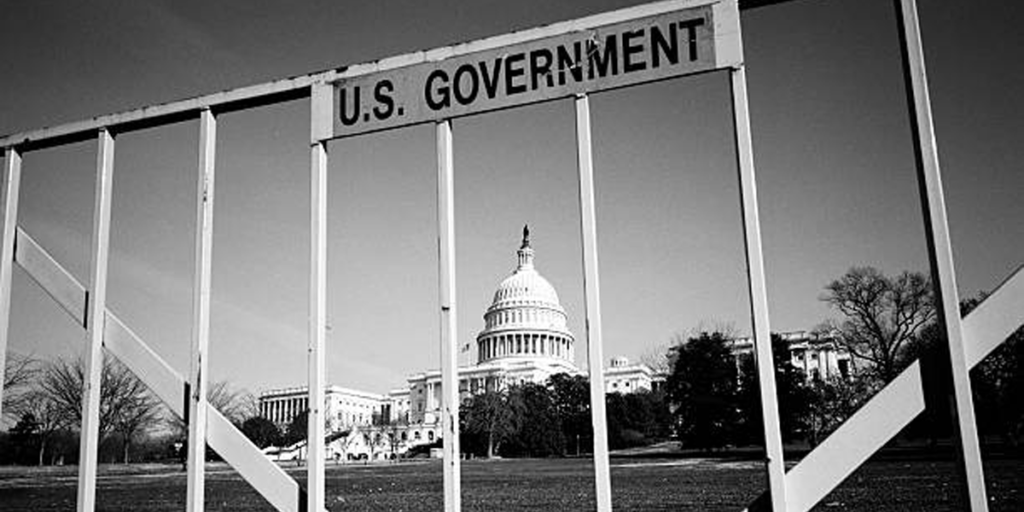
The Latest on the partial government shutdown (all times local): 2:50 p.m. House Speaker Nancy Pelosi is officially postponing President Donald Trump’s State of the Union address until the government is fully reopened. The California Democrat told Trump in a letter Wednesday the Democratic-controlled House won’t pass the required measure for him to give the nationally televised speech from the House floor. Pelosi acted just hours after Trump notified her that he was planning to deliver the speech next Tuesday in line with her original invitation. Pelosi’s moves have left the White House scrambling to devise an alternative plan for the speech, which is one of the president’s top opportunities to lay out his agenda to the public. Pelosi said “I look forward to welcoming you to the House on a mutually agreeable date for this address when government has been opened.” ___ 11:25 a.m. President Donald Trump is urging state and local Republican leaders to “stick together” on his border wall demands. Trump held a conference call with state, local and community leaders Wednesday on the 33rd day of the partial government shutdown. During his remarks, Trump said he would not back down in his push for $5.7 billion for a wall along the U.S.-Mexico border, calling it the “right policy.” The president also acknowledged there was “pressure” due to the shutdown, but argued it was worse for Democrats. Trump said “I think there’s more pressure on them than there is on us.” Polls show Trump gets most of the blame for the shutdown. Trump said: “We need this approved. We have to stick together.” ___ 11:20 a.m. A top White House economist says near-zero growth is possible in the first quarter if the government doesn’t fully reopen before the end of March. But Kevin Hassett, chairman of the Council of Economic Advisers, predicts a “humongous” rebound in the second quarter if the shutdown ends. Hassett told CNN on Wednesday that “we could end up with a number that’s very, very low” for January to March after the effects of an extended shutdown are factored into what typically is a weak first-quarter economic growth report. Pressed on whether that could mean no growth, Hassett said the number could be “very close to zero.” A stalemate between President Donald Trump and Democratic lawmakers over funding a U.S.-Mexico border wall has produced the longest partial government shutdown in U.S. history, now on Day 33. ___ 10:55 a.m. House Democrats are considering drafting a new proposal to provide President Donald Trump with options for securing the border that don’t involve a wall between the U.S. and Mexico. No final decisions have been made, according to a senior Democratic aide who spoke on condition of anonymity because the aide wasn’t authorized to discuss the lawmakers’ private discussions on the record. The proposals are likely to be drafted into a sweeping Homeland Security bill. Democratic Rep. Hakeem Jeffries of New York said Wednesday that personnel, technology and other options “are the things that would actually improve our border security.” Already, House Democrats have added $1.5 billion for border security to legislation being voted on this week. The funding would go toward immigration judges, bolstered infrastructure and aid to Central American countries. —Lisa Mascaro __ 10:15 a.m. The White House isn’t saying whether President Donald Trump will veto a bill that’s in the Senate to reopen the government through Feb. 8 while negotiations continue over his demand for a U.S.-Mexico border wall. But press secretary Sarah Huckabee Sanders also didn’t say that Trump would sign the bill. Sanders declined on Wednesday to “get into hypotheticals” over the bill, which has been passed by the Democratic-controlled House and is due for a vote Thursday in the Republican-led Senate. Sanders says Trump put forward a plan that doesn’t kick the problem down the road. She was referring to a bill also set for a Senate vote Thursday reflecting Trump’s offer to trade border wall funding for temporary protection for some immigrants. Democrats have rejected the plan. Trump says a border wall is non-negotiable. ___ 12:15 a.m. Two different votes are set in the Republican-controlled Senate with the aim to end the partial government shutdown. One vote Thursday will be on a bill reflecting President Donald Trump’s demand for border wall funding in exchange for temporary protections for some immigrants. A second vote is set for a measure already passed by the Democratic-controlled House to reopen the government through Feb. 8. It doesn’t allow money for a border wall but gives bargainers more time to talk. Neither bill is expected to advance under Senate rules requiring at least 60 votes. Senate Democrats have dismissed Trump’s proposal, and it’s unclear whether Senate Republicans will back Trump’s insistence that the government remain closed until lawmakers allocate $5.7 billion for his long-promised border wall with Mexico. Republished with permission from the Associated Press
Donald Trump wants to deliver State of Union next week as planned
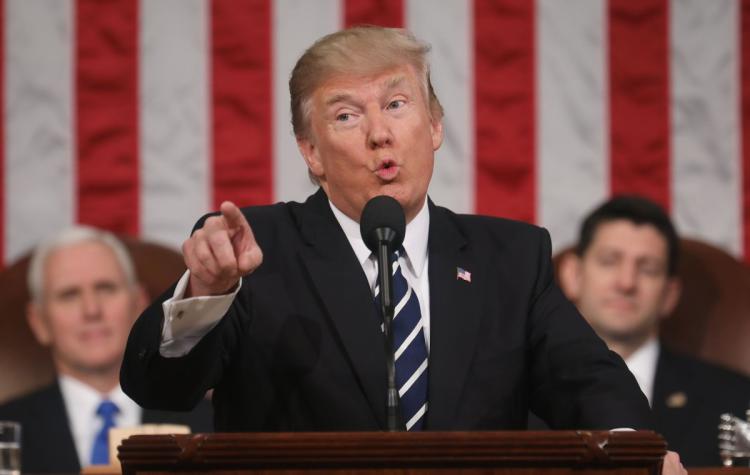
he White House is moving forward with plans for President Donald Trump to deliver his State of the Union speech next week in front of a joint session of Congress — despite a letter from House Speaker Nancy Pelosi requesting he delay it. The White House sent an email to the House sergeant-at-arms asking to schedule a walk-through in anticipation of a Jan. 29 address, according to a White House official who was not authorized to discuss the planning by name and spoke on condition of anonymity. “Nancy Pelosi made the invitation to the president on the State of the Union. He accepted,” said White House spokeswoman Sarah Huckabee Sanders. “At this point, we’re moving forward.” The move is the latest in a game of political brinksmanship between Trump and the House Speaker as they remain locked in an increasingly personal standoff over Trump’s demand for border wall funding that has forced a partial government shutdown that is now in its second month. The gamesmanship began last week when Pelosi sent a letter to Trump suggesting that he either deliver the speech in writing or postpone it until after the partial government shutdown is resolved, citing security concerns. But the White House maintains Pelosi never formally rescinded her invitation, and is, in essence, calling her bluff. “She has not canceled it. She asked us to postpone it,” White House spokesman Hogan Gidley said in an interview Tuesday with Fox News Channel. “We have no announcement at this time,” he said, “but Nancy Pelosi does not dictate to the president when he will or will not have a conversation with the American people.” At the same time, the White House is continuing to work on contingency plans to give Trump a backup in case the joint-session plans fall through. The president cannot speak in front of a joint session of Congress without both chambers’ explicit permission. A resolution needs to be agreed to by both chambers specifying the date and time for receiving an address from the president. Officials have been considering a list of potential alternative venues, including a rally-style event, an Oval office address— as Pelosi previously suggested — a speech before the Senate chamber, and even a return visit to the U.S.-Mexico border as Trump is expected to continue to hammer the need for a barrier, according to two others familiar with the discussions. Multiple versions are also being drafted to suit the final venue. The Constitution states only that the president “shall from time to time give to the Congress Information of the State of the Union,” meaning the president can speak anywhere he chooses or give his update in writing. But a joint address in the House chamber, in front of lawmakers from both parties, the Supreme Court justices and invited guests, provides the kind of grand backdrop that is hard to mimic and that this president, especially, enjoys. Still, North Carolina’s House Speaker Tim Moore wrote a letter inviting Trump to deliver the speech in the North Carolina House chamber. And Michigan House Speaker Lee Chatfield on Friday invited Trump to deliver the address at the state Capitol in Lansing instead. Trump called Moore Monday evening, according to his office, and spoke by phone with Chatfield Tuesday morning, Chatfield tweeted. “I understand you have other plans for #SOTU, but as we discussed, I look forward to hosting you in Michigan again soon,” Chatfield wrote. Pelosi in her letter had cited the impact of the ongoing shutdown on the Department of Homeland Security and the U.S. Secret Service, questioning whether they could secure the speech given that they have been operating without funding. Homeland Security Secretary Kirstjen Nielsen responded by assuring that DHS and Secret Service were “fully prepared to support and secure the State of the Union.” Asked about the letter by reporters Tuesday, Pelosi did not address the White House’s decision, saying only: “We just want people to get paid for their work.” Senior White House staff had been in a morning huddle discussing the upcoming speech when news of Pelosi’s letter first broke on TV. The power play — which Trump countered by revoking Pelosi’s use of a military aircraft, thereby canceling a congressional delegation visit to Afghanistan — had put the status of the marquee speech in limbo, leaving staff scrambling to figure out how to proceed. “We’ll keep you posted,” Sanders had told reporters when asked for a status update Friday. In their standoff, Trump has also accused Pelosi of behaving “irrationally,” while Pelosi has refused to negotiate with Trump on border funding until he agrees to reopen the government. In a tweet Sunday, Trump wrote that he was “still thinking about the State of the Union speech” and that there were “so many options – including doing it as per your written offer (made during the Shutdown, security is no problem), and my written acceptance.” “While a contract is a contract,” he wrote, “I’ll get back to you soon!” Republished with permission from the Associated Press.
Donald Trump, Nancy Pelosi feud heats up again
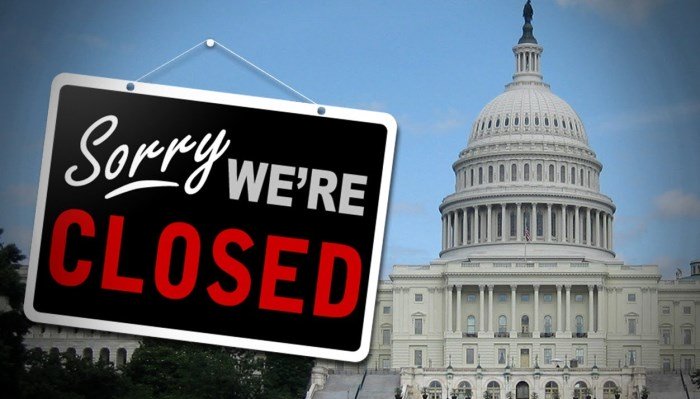
She imperiled his State of the Union address. He denied her a plane to visit troops abroad. The shutdown battle between President Donald Trump and House Speaker Nancy Pelosi is playing out as a surreal game of constitutional brinkmanship, with both flexing political powers from opposite ends of Pennsylvania Avenue as the negotiations to end the monthlong partial government shutdown remain stalled. In dramatic fashion, Trump issued a letter to Pelosi on Thursday, just before she and other lawmakers were set to depart on the previously undisclosed trip to Afghanistan and Brussels. Trump belittled the trip as a “public relations event” — even though he had just made a similar warzone stop — and said it would be best if Pelosi remained in Washington to negotiate to reopen the government. “Obviously, if you would like to make your journey by flying commercial, that would certainly be your prerogative,” wrote Trump, who had been smarting since Pelosi, the day before, called on him to postpone his Jan. 29 State of the Union address due to the shutdown. Denying military aircraft to a senior lawmaker — let alone the speaker, who is second in line to the White House, traveling to a combat region — is very rare. Lawmakers were caught off guard. A bus to ferry the legislators to their departure idled outside the Capitol on Thursday afternoon. The political tit-for-tat between Trump and Pelosi laid bare how the government-wide crisis has devolved into an intensely pointed clash between two leaders determined to prevail. It took place as hundreds of thousands of federal workers go without pay and Washington’s routine protocols — a president’s speech to Congress, a lawmaker’s official trip — became collateral damage. Pelosi spokesman Drew Hammill said the speaker planned to travel to Afghanistan and Brussels to thank service members and obtain briefings on national security and intelligence “from those on the front lines.” He noted Trump had traveled to Iraq during the shutdown, which began Dec. 22, and said a Republican-led congressional trip also had taken place. Trump’s move was the latest example of his extraordinary willingness to tether U.S. government resources to his political needs. He has publicly urged the Justice Department to investigate political opponents and threatened to cut disaster aid to Puerto Rico amid a spat with the island territory’s leaders. Some Republicans expressed frustration. Sen. Lindsey Graham tweeted, “One sophomoric response does not deserve another.” He called Pelosi’s State of the Union move “very irresponsible and blatantly political” but said Trump’s reaction was “also inappropriate.” While there were few signs of progress Thursday, Vice President Mike Pence and senior adviser Jared Kushner dashed to the Capitol late in the day for a meeting with Republican Senate Majority Leader Mitch McConnell. And the State Department instructed all U.S. diplomats in Washington and elsewhere to return to work next week with pay, saying it had found money for their salaries at least temporarily. For security reasons, Pelosi would normally make such a trip on a military aircraft supplied by the Pentagon. According to a defense official, Pelosi did request Defense Department support for overseas travel and it was initially approved. The official wasn’t authorized to speak by name about the matter, so spoke on condition of anonymity. The official said the president does have the authority to cancel the use of military aircraft. Rep. Adam Schiff of California slammed Trump for revealing the closely held travel plans. “I think the president’s decision to disclose a trip the speaker’s making to a war zone was completely and utterly irresponsible in every way,” Schiff said. Trump’s trip to Iraq after Christmas was not disclosed in advance for security reasons. White House spokeswoman Sarah Huckabee Sanders said Trump wanted Pelosi to stay in Washington before Tuesday, a deadline to prepare the next round of paychecks for federal workers. “We want to keep her in Washington,” Sanders said. “The president wants her here to negotiate.” The White House also canceled plans for a presidential delegation to travel to an economic forum in Switzerland next week, citing the shutdown. And they said future congressional trips would be postponed until the shutdown is resolved, though it was not immediately clear if any such travel — which often is not disclosed in advance — was coming up. Trump was taken by surprise by Pelosi’s move to postpone his address and told one adviser it was the sort of disruptive move he would make himself, according to a Republican who is in frequent contact with the White House and was not authorized to speak publicly about private conversations. While he maintained a public silence, Trump grew weary of how Pelosi’s move was being received on cable TV and reiterated fears that he was being outmaneuvered in the public eye. Trump was delighted at the idea of canceling Pelosi’s trip, believing the focus on the resources needed would highlight her hypocrisy for cancelling his speech, according to the Republican. Trump has still not said how he will handle Pelosi’s attempt to have him postpone his State of the Union address until the government is reopened so workers can be paid for providing security for the grand Washington tradition. Pelosi told reporters earlier Thursday: “Let’s get a date when government is open. Let’s pay the employees. Maybe he thinks it’s OK not to pay people who do work. I don’t.” Trump declined to address the stalemate over the speech during a visit Thursday to the Pentagon, simply promising that the nation will have “powerful, strong border security.” Pelosi reiterated she is willing to negotiate money for border security once the government is reopened, but she said Democrats remain opposed to Trump’s long-promised wall. “I’m not for a wall,” Pelosi said twice, mouthing the statement a third time for effect. The shutdown, the longest ever, entered its 28th day on Friday. The previous longest was 21 days in 1995-96, under President Bill Clinton. In a notice to staff, the State Department said it can pay
Mo Brooks proposes State of the Union be moved to Senate Chamber
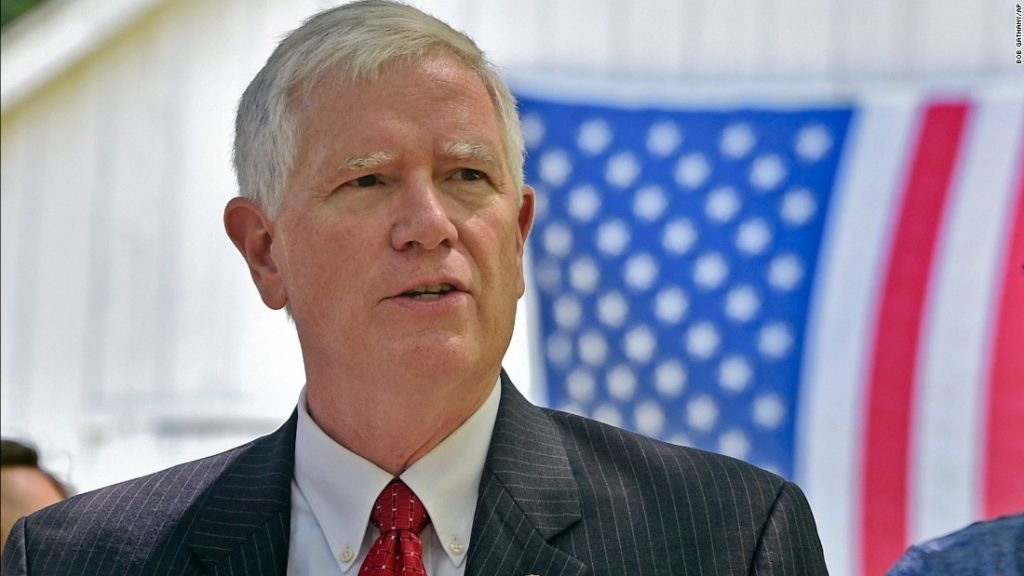
With the government shutdown stretching to nearly a month, Speaker of the House Nancy Pelosi asked President Donald Trump to postpone the upcoming State of the Union address. In a letter to the president on Wednesday, she wrote, Given the security concerns and unless the government re-opens this week, I suggest that we work together to determine another suitable date after government has re-opened for this address or for you to consider delivering your State of the Union address in writing to the Congress on January 29th. Kirstjen Nielsen, Secretary of Homeland Security, took to Twitter to ensure the public that the State of the Union can go ahead as planned. The Department of Homeland Security and the US Secret Service are fully prepared to support and secure the State of the Union. We thank the Service for their mission focus and dedication and for all they do each day to secure our homeland. — Secretary Kirstjen M. Nielsen (@SecNielsen) January 16, 2019 Thursday, Alabama 5th District Rep. Republican Mo Brooks called for President Trump to move the speech from the House to the Senate Chamber in response, In a letter to the president, Vice President Pence, and Senate Majority Leader Mitch McConnell, Brooks called Pelosi’s request “hyper partisan.” He concluded his letter by saying, I most strongly encourage Vice-President Mike Pence, in his Constitutional capacity as the presiding officer of the Senate, and Senate Majority Leader Mitch McConnell, to invite President Trump to report to the American people on the state of the union in the Senate Chamber. While traditionally these addresses have been held in the House Chamber due to its larger size, inasmuch as House Democrats apparently do not want to hear from the President anyway, overcrowding of the Senate chamber should not be an issue. I urge President Trump, Vice-President Pence (as President of the Senate), and Leader McConnell to maintain January 29, 2019 as the date on which President Trump can address the American people from the Senate Chamber, thus putting President Trump with our first president, George Washington, who also gave his first State of the Union address in the Capitol’s Senate Chamber. Brooks also responded to Pelosi on Wednesday, saying she was using the address as a “political bargaining chip.”
GOP dismisses suggestion that State of Union be postponed
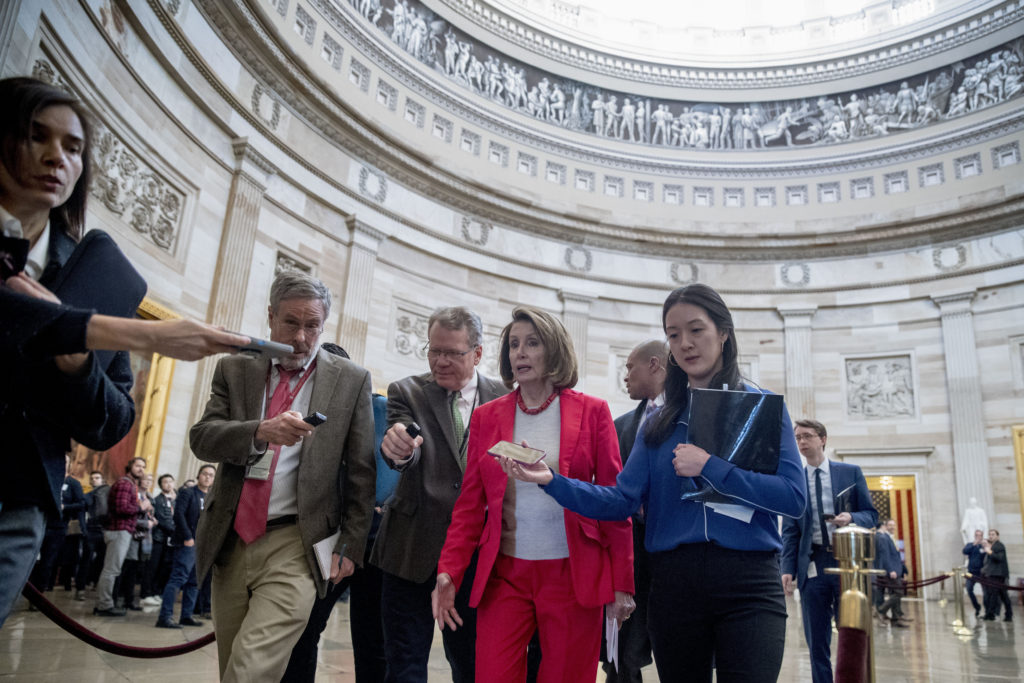
A grand Washington ritual became a potential casualty of the partial government shutdown as House Speaker Nancy Pelosi asked President Donald Trump to postpone his Jan. 29 State of the Union speech. She cited concerns about whether the hobbled government can provide adequate security, but Republicans cast her move as a ploy to deny Trump the stage. In a letter to Trump, Pelosi said that with both the Secret Service and the Homeland Security Department entangled in the shutdown, the president should speak to Congress another time or he should deliver the address in writing. Homeland Security Secretary Kirstjen Nielsen denied anyone’s safety is compromised, saying Wednesday that both agencies “are fully prepared to support and secure the State of the Union.” Trump did not immediately respond to the request, and the White House, thrown off guard by the move, didn’t immediately offer any official response. But GOP allies accused Pelosi of playing politics, with Republican Rep. Steve Scalise tweeting that Democrats are “only interested in obstructing @realDonaldTrump, not governing.” Pelosi, who issued the customary invitation to Trump weeks ago, hit the president in a vulnerable place, as he delights in taking his message to the public and has been preparing for the address for weeks. The uncertainty surrounding the speech also underscored the unraveling of ceremonial norms and niceties in Trump’s Washington, with the shutdown in its fourth week, the White House and Democrats in a stalemate and the impasse draining the finances of hundreds of thousands of federal employees. Pelosi left unclear what would happen if Trump insisted on coming despite the welcome mat being pulled away. It takes a joint resolution of the House and Congress to extend the official invitation and set the stage. “We’ll have to have a security evaluation, but that would mean diverting resources,” she told reporters when asked how she would respond if Trump still intended to come. “I don’t know how that could happen.” Trump stayed quiet on the request throughout the day. During an Oval Office visit, Sen. Rand Paul said they discussed the shutdown but the president did not offer any reaction to Pelosi’s suggestion to put off the speech. Paul suggested on Twitter on Thursday that Trump deliver the address in the Senate, where Republicans hold a majority, which would be an unusual move. “If Mrs. Pelosi refuses to allow the president to deliver the State of the Union in the House, I propose we move it to the Senate and make it happen!” Paul said. Pressure on Trump intensified on Wednesday, the 26th day of the shutdown, as lawmakers from both parties scrambled for solutions. At the White House, Trump met a bipartisan group of lawmakers, as well as a group of Republican senators, but progress appeared elusive. The shutdown, already the longest ever, entered its 27th day Thursday. The previous longest was 21 days in 1995-96, when Bill Clinton was president. While Trump’s own advisers said the shutdown was proving a greater drag on the economy than expected, Trump showed no signs of backing off a fight that he views as vital for his core supporters. On Wednesday, Trump signed legislation into law affirming that the roughly 800,000 federal workers who have been going without pay will ultimately be compensated for their lost wages. That was the practice in the past. As he weighs a response to Pelosi, Trump could not go forward with a State of the Union address in Congress without her blessing. Donald Ritchie, former historian of the Senate, said that anytime a president comes to speak, it must be at the request of Congress. Trump could opt to deliver a speech somewhere else, like the Oval Office, but it would not have the same ritualistic heft. Democratic leaders did not ask the Secret Service if the agency would be able to secure the State of the Union event before sending the letter, according to a senior Homeland Security official, who was not authorized to speak publicly. Pelosi’s office said Congress is already familiar with the percentage of Secret Service and Homeland Security employees who have been furloughed and working without pay. The Secret Service starts preparing for events like these months in advance. Lawmakers struggled to find a way out of the shutdown Wednesday. Trump is demanding $5.7 billion to build a wall along the Mexican border that he says is needed on humanitarian and security grounds. But Pelosi is refusing money for the wall she views as ineffective and immoral, and Democrats say they will discuss border security once the government has reopened. Some expressed little optimism. Sen. Lindsey Graham, a South Carolina Republican who has been working on bipartisan strategies, declared glumly: “I am running out of ideas.” Trump met a bipartisan group of lawmakers Wednesday that included seven Democrats. Two people who attended the White House meeting agreed it was “productive,” but could not say to what extent Trump was listening or moved by the conversation. The people, who spoke on condition of anonymity to discuss the event candidly, said it seemed at some points as if people were talking past each other. Lawmakers talked about the shutdown’s effect on their constituents and advocated for “border security.” Trump and others on-and-off used the term “wall.” It was not clear if progress had been made, by those accounts. Meanwhile a group of Republican senators headed to the White House later Wednesday. Many Republicans were unwilling to sign on to a letter led by Graham and Sen. Chris Coons, D-Del., to reopen the government for three weeks while talks continue. They had been warned off such a strategy by Vice President Mike Pence and White House senior adviser Jared Kushner, who told them Trump opposed such a short-term fix, but the senators pressed on anyway, trying to get 20 Democrats and 20 Republicans to join. While Sen. Susan Collins, R-Maine, said she has signed, others said GOP support was lacking. “They’re a little short on the R side,” said Sen.
Martha Roby: Reflecting upon the State of the Union
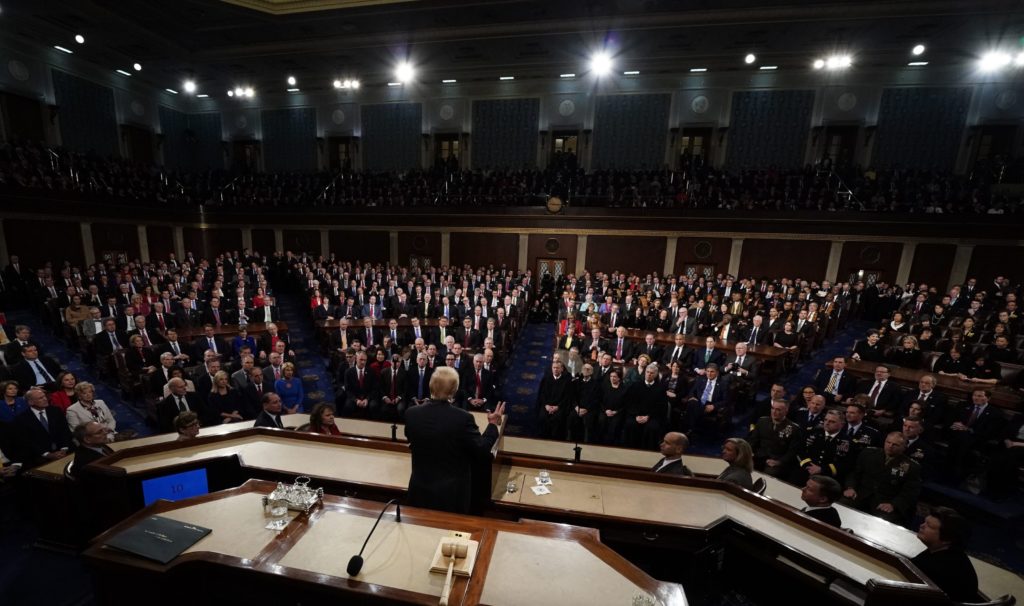
Each year, the State of the Union address provides an important opportunity for the President to speak directly to Congress and the American people and offer an update on his priorities and plans to accomplish them. I recently attended President Donald Trump’s first State of the Union address with my daughter Margaret. She’s taking civics this year and was required to watch the address for class credit, and so I thought this would be a unique opportunity for her to witness it firsthand. I was glad to hear what the President had to say. In his first State of the Union address, President Trump reflected on the economic successes Americans have already experienced as a result of historic tax reform, and he laid out his vision for our country’s future. Hundreds of companies have already given bonuses to more than 3 million employees just months after the enactment of our tax reform plan, and this is only the beginning. I was particularly encouraged by the President’s remarks about working with Congress to overhaul the crumbling infrastructure in our country. Having reliable roads and bridges is so important to businesses across Alabama and our entire nation. I’m pleased that this was a key topic in the State of the Union address, and I’m eager to learn more about the Administration’s infrastructure plan in the coming weeks. In addition, President Trump spoke about rebuilding our military, properly caring for our veterans, and bolstering our national security. Our district is home to two of our nation’s finest military installations, thousands of active duty and reserve personnel, and nearly 16,000 military retirees. I’m thankful that this Administration has made it clear that they are committed to working with Congress to fight for those who defend our freedoms. Throughout his address, President Trump introduced many of his remarkable guests. I was truly inspired by all of them, including New Mexico Police Officer Ryan Holets and his wife Rebecca who adopted a child from a woman struggling with a substance abuse, Retired Marine Corporal Matthew Bradford who became the first blind double-amputee to re-enlist in the Marines, and 12-year old Preston Sharp who organizes the placement of American flags on the graves of fallen soldiers. All of these individuals represent the strength, bravery, hope, and compassion that is uniquely American. The morning after the President’s address, I joined my fellow House and Senate Republicans at our annual conference retreat. I’m always appreciative of this opportunity for both chambers of Congress to get together to talk about ways we can continue to deliver on our promises to the American people. There were a lot of topics covered, including one that I am greatly interested in: workforce development. Our unified Republican government and the Administration have already rolled back countless rules and regulations and delivered on tax reform, so now we must take the next steps to ensure our economy continues to thrive. It is critical that we train our workforce for the jobs that are being created every day, and I look forward to continuing to support workforce development programs. Many members of the Administration also joined us at the retreat, including President Trump, Vice President Mike Pence, Secretary of Defense Jim Mattis, Secretary of State Rex Tillerson, and UN Ambassador Nikki Haley. I had the exciting opportunity to introduce Counselor to the President Kellyanne Conway at our closing breakfast and thank her for the encouragement she gives to so many working moms and families who are navigating the delicate field of work-life balance. I know that many of the issues the President referenced in his State of the Union address and that we discussed at our retreat are critically important to the people I represent. I am eager to continue working with this Administration and my colleagues in Congress to deliver the meaningful conservative results that Americans deserve. ••• Martha Roby represents Alabama’s Second Congressional District. She lives in Montgomery, Alabama with her husband Riley and their two children.
Will Davis: The state of our union is strong

When it comes to the annual State of the Union address, much is often said, but little is actually addressed. The event exists as an opportunity for politicians to repeat their favorite platitudes and for the D.C. political class to rub shoulders. What really matters is not the State of the Union address, but what proceeds it. We are now one year into Donald Trump‘s presidency and conservatives have to be happy, maybe even pleasantly surprised at what President Trump and this Republican Congress have been able to accomplish in one year. Conservatives are used to the Republican party letting us down, but this year has been different. We’ve seen one of the largest tax cuts in American history, which corresponded with the first remaking of the tax code since Ronald Reagan‘s presidency. We have already seen the results of this tax cut come to fruition, including in our home state of Alabama where Toyota and Mazda announced a new $1.6 billion plant in Huntsville that will create 4,000 new jobs for Alabamians. The United States also saw its first year of 3% GDP growth since George W. Bush‘s first term. In addition, we have also confirmed great constitutionalist judges, including Justice Neil Gorsuch to the Supreme Court. Through remaking the courts, we have a chance to end judicial tyranny in this country and restore the rule of law. The promise of appointing judges after years of activist court rulings was a big reason why some skeptical conservatives held their nose to vote for Donald Trump. He has delivered in this area more than any of us could have expected. Lastly, many concerns about Trump’s presidency involved his foreign policy. Many folks were concerned that somebody with no experience would have significant trouble in the area where the President has the most power and the most responsibility. Yet Trump has assuaged those concerns in his first year in office. He has surrounded himself with some of the most brilliant minds in the country including the likes of Jim Mattis, Nikki Haley, and Mike Pompeo. In Trump’s first year, ISIS is all but done, Jerusalem has finally been recognized as the Capital of Israel, Syria has ceased use of their chemical weapons program, and Iran and Russia have been put on notice. Our foreign policy has made some of the greatest strides in a generation, thanks to this administration. With the economy roaring, the Middle East stabilizing, and the Supreme Court headed in a constitutionalist direction, it’s fair to say that the state of our union is strong. Welcome to Donald Trump’s America, where ISIS is dead and the economy is alive. ••• William Davis is a sophomore at the University of Alabama. There he is involved in various conservative groups and organizations.
Alabama reaction to Donald Trump’s first State of the Union address
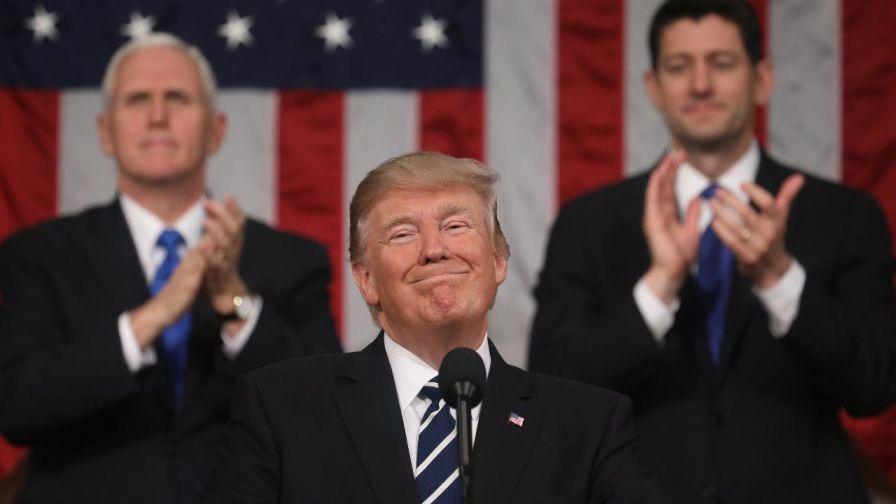
President Donald Trump gave his first State of the Union address Tuesday night where he touched on everything from jobs and infrastructure to ISIS. The speech was one of the longer speech’s given by a Commander-in-Chief, spanning an hour and 20 minutes, and when it concluded Alabama’s congressional delegation and state politicians offered their reactions to the speech, falling mostly along party lines in terms of opinion. Here are of some of the highlights: Governor Kay Ivey – Republican: Tonight, President Trump made clear his commitment to the American people and to improving the quality of life for everyone. By protecting our borders, strengthening our military and creating an environment that enhances domestic economic growth, the president underlined his commitment to national security. I echo his call to further improve our economy through continued deregulation, low taxes and investment in infrastructure. U.S. Senator Richard Shelby – Republican: Tonight the President highlighted his many accomplishments and outlined his plan to continue advancing and unifying our country. From signing tax reform into law and eliminating restrictive regulations to growing our military and boosting support for veterans, President Trump has prioritized a conservative agenda that promotes a safe and strong America. I look forward to his promise of rebuilding our infrastructure, which would keep our economy on the rise and provide significant opportunities to foster local economic growth. 1st District U.S. Rep. Bradley Byrne – Republican: The ‘state of our Union’ is strong. From a booming economy to greater respect around the globe, President Trump, his administration, and Congress have been able to turn our country around in a very short period of time. The good news is that things are just getting started. 4th District U.S. Rep. Robert Aderholt – Republican: Despite resistance from the Washington establishment, President Trump’s first year has been marked with robust economic growth, job creation, record highs in the stock market and record lows when it comes to unemployment. Because of President Trump’s willingness to shake things up in Washington, and to step over entrenched partisan lines, the State of the Union is strong. 6th District U.S. Rep. Gary Palmer – Republican: President Trump ran on promises to make America more prosperous and more secure, and in his first year in office he has begun to deliver on those promises. As President Trump made clear tonight, he and the Republican majorities in the House and Senate are just getting started. 7th District U.S. Rep. Terri Sewell – Democat: The promises President Trump made tonight in his State of the Union Address are worth about as much as the promises candidate Trump made on the campaign trail: absolutely nothing. One year into this Administration, Trump has attacked Medicaid, which he promised to protect, he forced through tax cuts favoring the wealthy after promising tax relief for the middle class, and he eliminated coverage for millions of Americans after promising to expand healthcare access. President Trump is more focused on defending himself and attacking his opponents than helping the country. Alabama families need more jobs that pay better wages, and that is what I am fighting for in Congress.”
Here’s who the Alabama congressional delegation is bringing to the State of the Union
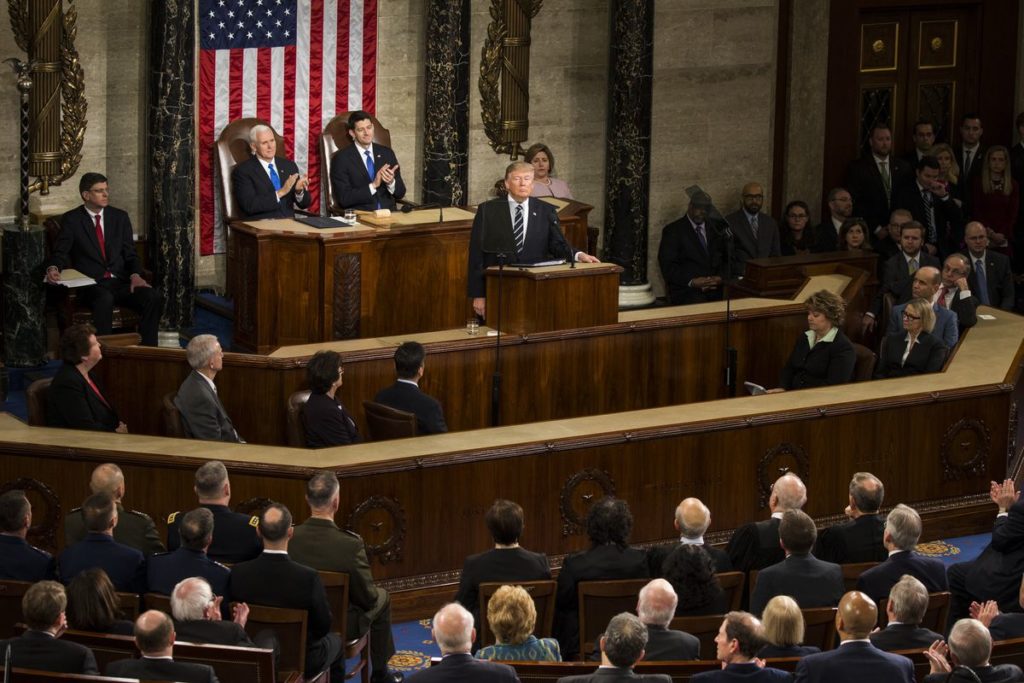
President Donald Trump is scheduled to deliver his first State of the Union address Tuesday and the entire Alabama congressional delegation will be in attendance. Members of Congress are given one ticket to bring a guest to the annual event. Typically, members give the tickets to family members, staffers or constituents. Here’s a rundown of whom members of the Alabama delegation are taking as their guests: Sen. Richard Shelby: Shelby will be bringing his long-time friend, Steve Flowers, as his guest. Flowers is Alabama’s leading political columnist. His weekly column appears in over 60 Alabama newspapers (including Alabama Today). He served 16 years in the state legislature. Sen. Doug Jones: Jones will be taking his wife, Louise Jones. Alabama 1st District U.S. Rep. Bradley Byrne: Byrne will be accompanied by Pete Riehm from Mobile, Ala. Pete is a former Navy Surface Warfare Officer and now a businessman in the Mobile area. He is also a leader in the local veterans community. Alabama 2nd District U.S. Rep. Martha Roby: Roby will be taking her daughter, Margaret Roby. Margaret is taking Civics this year and is required to watch the State of the Union address for class, so Roby thought this would be a unique opportunity for her to witness it firsthand. Alabama 3rd District U.S. Rep. Mike Rogers: Mike’s wife, Beth Rogers, will be joining him for the evening. According to Rogers’ office, they’re both excited to support President Trump in his first SOTU! Alabama 4th District U.S. Rep. Robert Aderholt: Yet to respond to request. Alabama 5th District U.S. Rep. Mo Brooks: Yet to respond to request. Alabama 6th District U.S. Rep. Gary Palmer: Palmer is bringing his wife Ann Palmer as his guest. Alabama 7th District U.S. Rep. Terri Sewell: Sewell will be accompanied by Mary Joyce Owens, the granddaughter of Recy Taylor. Alabama native Recy Taylor recently made headlines when Oprah Winfrey mentioned her in her in her Golden Globes speech. Taylor, who recently passed away, was an outspoken advocate for victims of sexual assault after being raped in 1944 by six white men who were never brought to justice. Sewell said the Democratic Women’s Working Group will be wearing all black in solidarity with the #MeToo movement and women CBC Members are inviting representatives to wear red Recy Taylor pins at the State of the Union. “Recy Taylor was an American shero and an Alabama treasure who spoke up in the face of racism, hate, and sexual violence,” said Sewell. “While she is no longer with us today, I think Recy Taylor would be proud to know that her granddaughter, Mary Joyce Owens, is attending the State of the Union in honor of her legacy and our ongoing fight against racism and sexual misconduct. By standing up to injustice over six decades ago, Recy Taylor inspired generations of men and women to hold perpetrators of sexual violence accountable. Mary Joyce Owens’ presence at the State of the Union is a symbol of the bravery of all those who are speaking out and a reminder that we will not be silent in the face of injustice.”
10 must-read quotes from Barack Obama’s final State of the Union
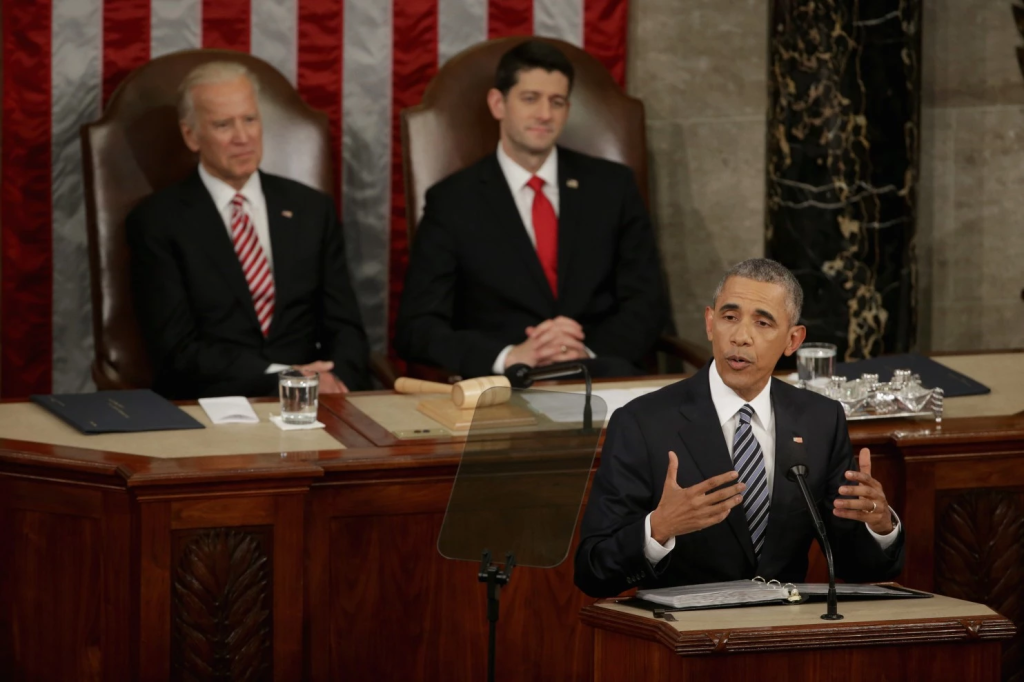
President Barack Obama used his seventh and final State of the Union Tuesday night to address broad programs and topics, rather than discuss specific policy ideas. Below we’ve rounded up 10 of the most significant quotes from the President’s speech. Click here to read the full text. On politics: The future we want — opportunity and security for our families; a rising standard of living; and a sustainable, peaceful planet for our kids — all that is within our reach. But it will only happen if we work together. It will only happen if we can have rational, constructive debates. It will only happen if we fix our politics. On terrorism: “Priority No. 1 is protecting the American people and going after terrorist networks. Both al Qaeda and now ISIL pose a direct threat to our people, because in today’s world, even a handful of terrorists who place no value on human life, including their own, can do a lot of damage.” On American strength: When you come after Americans, we go after you. It may take time, but we have long memories, and our reach has no limit. On voting: So, my fellow Americans, whatever you may believe, whether you prefer one party or no party, our collective future depends on your willingness to uphold your obligations as a citizen. To vote. To speak out. To stand up for others, especially the weak, especially the vulnerable, knowing that each of us is only here because somebody, somewhere, stood up for us. On climate change: We’ve got to accelerate the transition away from dirty energy. Rather than subsidize the past, we should invest in the future — especially in communities that rely on fossil fuels. That’s why I’m going to push to change the way we manage our oil and coal resources, so that they better reflect the costs they impose on taxpayers and our planet. On the economy: Let me start with the economy, and a basic fact: the United States of America, right now, has the strongest, most durable economy in the world … anyone claiming that America’s economy is in decline is peddling fiction. On America’s military: The United States of America is the most powerful nation on Earth. Period. It’s not even close. We spend more on our military than the next eight nations combined. Our troops are the finest fighting force in the history of the world. No nation dares to attack us or our allies because they know that’s the path to ruin. … when it comes to every important international issue, people of the world do not look to Beijing or Moscow to lead: They call us. On American entrepreneurship: That spirit of discovery is in our DNA. We’re Thomas Edison and the Wright Brothers and George Washington Carver. We’re Grace Hopper and Katherine Johnson and Sally Ride. We’re every immigrant and entrepreneur from Boston to Austin to Silicon Valley racing to shape a better world. And over the past seven years, we’ve nurtured that spirit. On bipartisanship: Mr. Speaker, I appreciate the constructive approach you and the other leaders took at the end of last year to pass a budget and make tax cuts permanent for working families. So I hope we can work together this year on bipartisan priorities like criminal justice reform, and helping people who are battling prescription drug abuse. We just might surprise the cynics again. On diversity: We need to reject any politics that targets people because of race or religion. This isn’t a matter of political correctness. It’s a matter of understanding what makes us strong. The world respects us not just for our arsenal; it respects us for our diversity and our openness and the way we respect every faith.
Here’s the full text of President Obama’s final State of the Union address
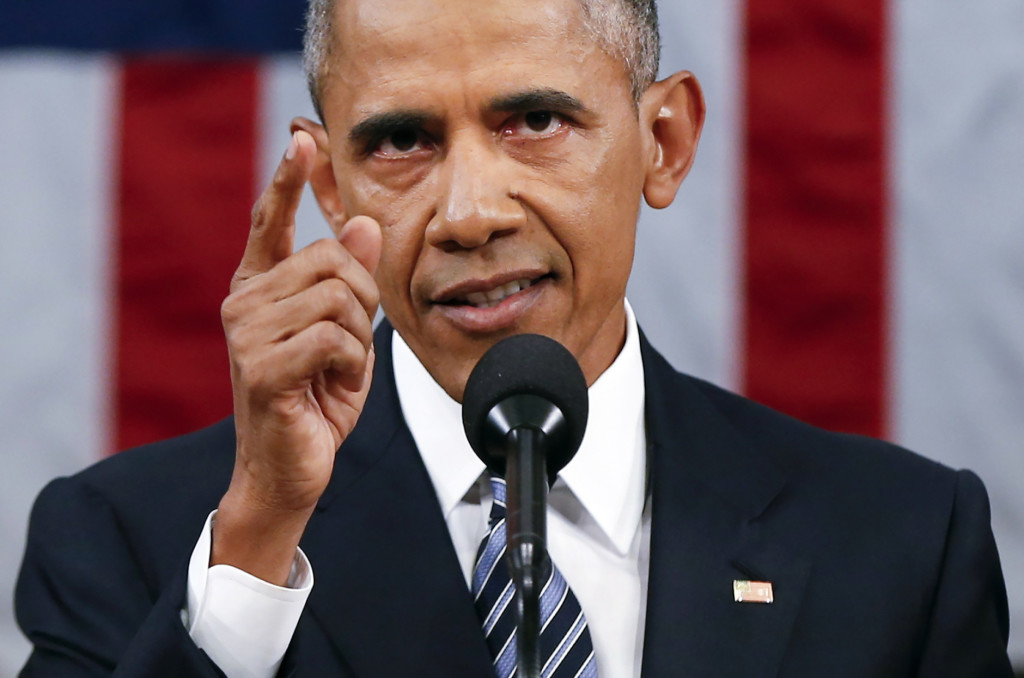
U.S. President Barack Obama delivered his final State of the Union address Tuesday night. Here’s the full text, from the White House: Mr. Speaker, Mr. Vice President, Members of Congress, my fellow Americans. Tonight marks the eighth year I’ve come here to report on the State of the Union. And for this final one, I’m going to try to make it shorter. I know some of you are antsy to get back to Iowa. I also understand that because it’s an election season, expectations for what we’ll achieve this year are low. Still, Mr. Speaker, I appreciate the constructive approach you and the other leaders took at the end of last year to pass a budget and make tax cuts permanent for working families. So I hope we can work together this year on bipartisan priorities like criminal justice reform, and helping people who are battling prescription drug abuse. We just might surprise the cynics again. But tonight, I want to go easy on the traditional list of proposals for the year ahead. Don’t worry, I’ve got plenty, from helping students learn to write computer code to personalizing medical treatments for patients. And I’ll keep pushing for progress on the work that still needs doing. Fixing a broken immigration system. Protecting our kids from gun violence. Equal pay for equal work, paid leave, raising the minimum wage. All these things still matter to hardworking families; they are still the right thing to do; and I will not let up until they get done. But for my final address to this chamber, I don’t want to talk just about the next year. I want to focus on the next five years, ten years, and beyond. We live in a time of extraordinary change — change that’s reshaping the way we live, the way we work, our planet and our place in the world. It’s change that promises amazing medical breakthroughs, but also economic disruptions that strain working families. It promises education for girls in the most remote villages, but also connects terrorists plotting an ocean away. It’s change that can broaden opportunity, or widen inequality. And whether we like it or not, the pace of this change will only accelerate. America has been through big changes before — wars and depression, the influx of immigrants, workers fighting for a fair deal, and movements to expand civil rights. Each time, there have been those who told us to fear the future; who claimed we could slam the brakes on change, promising to restore past glory if we just got some group or idea that was threatening America under control. And each time, we overcame those fears. We did not, in the words of Lincoln, adhere to the “dogmas of the quiet past.” Instead we thought anew, and acted anew. We made change work for us, always extending America’s promise outward, to the next frontier, to more and more people. And because we did — because we saw opportunity where others saw only peril — we emerged stronger and better than before. What was true then can be true now. Our unique strengths as a nation — our optimism and work ethic, our spirit of discovery and innovation, our diversity and commitment to the rule of law — these things give us everything we need to ensure prosperity and security for generations to come. In fact, it’s that spirit that made the progress of these past seven years possible. It’s how we recovered from the worst economic crisis in generations. It’s how we reformed our health care system, and reinvented our energy sector; how we delivered more care and benefits to our troops and veterans, and how we secured the freedom in every state to marry the person we love. But such progress is not inevitable. It is the result of choices we make together. And we face such choices right now. Will we respond to the changes of our time with fear, turning inward as a nation, and turning against each other as a people? Or will we face the future with confidence in who we are, what we stand for, and the incredible things we can do together? So let’s talk about the future, and four big questions that we as a country have to answer — regardless of who the next President is, or who controls the next Congress. First, how do we give everyone a fair shot at opportunity and security in this new economy? Second, how do we make technology work for us, and not against us — especially when it comes to solving urgent challenges like climate change? Third, how do we keep America safe and lead the world without becoming its policeman? And finally, how can we make our politics reflect what’s best in us, and not what’s worst? Let me start with the economy, and a basic fact: the United States of America, right now, has the strongest, most durable economy in the world. We’re in the middle of the longest streak of private-sector job creation in history. More than 14 million new jobs; the strongest two years of job growth since the ’90s; an unemployment rate cut in half. Our auto industry just had its best year ever. Manufacturing has created nearly 900,000 new jobs in the past six years. And we’ve done all this while cutting our deficits by almost three-quarters. Anyone claiming that America’s economy is in decline is peddling fiction. What is true — and the reason that a lot of Americans feel anxious — is that the economy has been changing in profound ways, changes that started long before the Great Recession hit and haven’t let up. Today, technology doesn’t just replace jobs on the assembly line, but any job where work can be automated. Companies in a global economy can locate anywhere, and face tougher competition. As a result, workers have less leverage for a raise. Companies have less loyalty to their communities. And more and more wealth and income is concentrated at the very top. All these trends have squeezed workers, even when they have jobs; even when the


